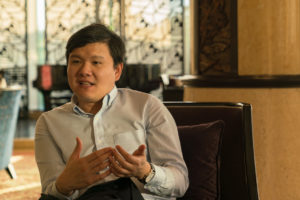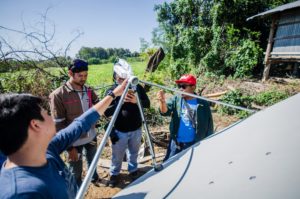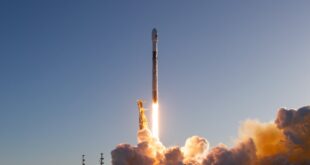
Thai New Space startup mu Space is making big waves in Thailand with its efforts to bridge the digital divide in rural Thailand, and ultimately, in other parts of Southeast Asia, and with its long-term plans to bring commercial space travel to Thailand and the wider region. mu Space brings a vibrant New Space startup dynamic to Thailand, as the country embarks on its Thailand 4.0economic modernisation initiative where mu Space finds itself very much at the forefront. SpaceWatch.Global has been covering mu Space’s progress for months, and we managed to talk with its founder and Chief Executive Officer James Yenbamroong to hear his thoughts about the progress of mu Space so far, and its future plans.
What motivated you to start mu Space?
While doing my master’s in mechanical engineering at University of California, Los Angeles (UCLA), I was also working with Northrop Grumman as a project lead for unmanned vehicles and satellite systems. From my work, I gain better understanding on the uses of satellite. Not only satellites are used for communications, but for other things that many people are not aware of — for example environment monitoring, and search and rescue operations. I think there are other satellite applications that are beneficial for mankind that can be explored — and this, together with my inner passion of using technology to improve the quality of life, fueled my determination to start my own startup mu Space.
Describe to us your passion for space.
I like anything about space and satellite technology. Since when I was young, I’m already fascinated with the moon and the constellation you see when you look in the sky at night. That definitely fueled my decision to take a degree in aerospace engineering later on at UCLA.
mu Space has an ambitious agenda providing everything from remote access and mobile backhaul through to inflight and maritime connectivity. Tell us how you see the market opportunities in Thailand for these services and how mu Space is positioned to provide for them?
Just to clarify, we currently focus on providing broadband to rural areas. We’re still shaping our package for the other services.
Regarding rural broadband, in Thailand, the local government has a project to connect remote villages to broadband and mobile networks. The project is worth US$ 449 million and will connect nearly 4,000 remote villages to broadband. Many of these villages are so remote that they’re just beyond the reach of infrastructures. So, satellites are used to provide these villages and the people with broadband and mobile coverage. These satellite applications are essential to urban development and to make quality of life better for all.
We position mu Space as a startup that offers satellite-based services that are more cost-effective, promises better customer service support, and offers greater flexibility for clients to choose the services that best suit their business model.
What differentiates mu Space from its regional and global competitors in these market sectors?
There are several established satellite companies in Southeast Asia, but we are not aware of any satellite startup in the region. I think we’re the only one in Thailand and in Southeast Asia — and that makes us different than the rest.
Another factor that differentiates us is our long term plan. It was predicted that the space industry worldwide will be worth US$ 2.7 trillion in the next 30 years; therefore, we target to join the space race with the launch of our own satellite in 2020 and by providing space tourism service for the Asia-Pacific market in the next decade.
What are the biggest economic and business risks for mu Space?
Like other companies that started from scratch, founding a space technology startup requires guts, determination, a lot of moral support from family and friends, and huge financial backing from investors. It’s both exciting and hard.
One of the big challenges of being a new startup is building our brand to make us known to the public. We have to invest extra time and energy to promote and prove to business clients that we deliver better quality service at reasonable costs.
What are your plans for technology development in Thailand? Where, if any, do you see opportunities for mu Space in this regard?
Space technology, for many people, is a hard-to-understand topic. We want to change that; we want to change people’s perception and show space is a fun topic. To promote better public understanding about space, we’re building an open research lab in Bangkok to test the space products we’re developing and showcase them to the public. These products could include the space suits, gloves and gadgets that will be used on our future space tourism programme.

You recently signed an agreement with Blue Origin to launch the mu Space satellite, Can you tell us more about the satellite?
It’s a high throughput, Ka-/Ku-band geostationary satellite to be used as backhaul for broadband, mobile, broadcasting, Internet of Things devices and smart city apps.
We picked Blue Origin because of their concept of a reusable rocket. It is a major breakthrough in space technology. We expect that with this system, launching a satellite would be cheaper in the future.
Are you concerned about overcapacity for satellite communications in the Asia-Pacific? What differentiates the mu Space approach to SATCOM from that of your potential competitors?
We’re not concerned; providing broadband service via satellite is just a part of our long-term plan.
It was predicted that the space industry worldwide will be worth U.S.$2.7 trillion in the next 30 years; therefore, we target to join the space race with the launch of our own satellite in 2020.
Aside from satellite-enabled Internet, I think there are other satellite applications that can be explored — for example environment monitoring, search and rescue operations, and smart city applications. We see business opportunities in these applications.
Do you see any opportunities for strategic partnerships to achieve your strategic aims? In what areas of your business do you envision (if at all) such partnerships?
We are now in talks with prospective partners who can provide us the needed funds for our satellite project. We’re also in negotiation with manufacturing companies who can build our satellite. Further information on these partnerships will be available at later time.
What about other countries in Southeast Asia, such as Myanmar, Cambodia, Laos, Vietnam, and Malaysia – is there opportunity for mu Space in these countries?
We’re doing a rural connectivity project in Thailand. We’re planning to do the same projects in Southeast Asian countries that don’t have their own satellite, like Myanmar, Cambodia, and Laos.
Do you look at China and the Belt and Road Initiative, with its Space Silk Road component, as an opportunity. If so, how?
We have no plans at this time.
The Thai government is pushing the Thailand 4.0 initiative to modernise the Thai economy in to an innovation, high tech, high value economy. How does mu Space fit into this initiative?
The projects that we are involved in — satellite, the digital park and space tourism — are a manifestation of our strong support to the Thai government’s plan tofast track the digitalization of Thailand’s economy. Both public and private sectors in Thailand are working together to invest funds and energy to develop modern digital infrastructures to support the country’s transformation into a technological hub in the region. I have not seen anywhere in Southeast Asia such commitment from the public and the government, except in Thailand.
One of the challenges identified by Thailand 4.0 is a sufficiently educated Thai workforce, particularly in STEM subjects. Is this an issue for mu Space, especially for recruitment?
In general, it’s not really that difficult to find young technology professionals in Thailand. For example, when we advertise engineering jobs like Network Engineer, we usually get about 500 applicants per month on average.
However, we also acknowledge that for engineering positions that we’re planning to get in the future — like Antenna Design Engineer, Material Design Engineer, etc — these roles require specialized skills and could be difficult to find within Thailand.
Are you looking at initiatives with Thai universities and other institutions to encourage STEM education and ensure a stream of qualified graduates?
Currently, some of our staff are invited at university events to talk about satellite communications. These activities, we believe, make tech students hopeful for the future to be able to work in the tech industry after graduation.
We are also looking at joining job fairs held in universities to encourage tech students to take internship jobs with us.
How supportive has the Thai government been in supporting mu Space’s business and ambitions? What more can or should they be doing?
We received the license from the National Broadcasting and Telecommunications Communication (NBTC) last year. The license allows us to operate satellite service in Thailand, and secured our claim of being the first space technology startup in Thailand.
Thailand has made significant progress in broadband penetration, however the country is still facing several challenges, such as some of our local policies need to be updated and our digital infrastructures need to be improved. We need to do more so Thailand’s tech industry would be competitive in the region. In that way, it’s easier for Thailand to attract new investors, startups and foreign workforce.
How would you characterise the New Space scene in Thailand? Where do you see it in ten years from now, and mu Space’s place in it?
New Space is still an unexplored business in Thailand. We’re not aware of any other company in Thailand that is into commercial space travel, only us. We’re hopeful we’ll be better in a decade from now. For Thailand to attract new investors, startups, and foreign workforce in New Space, the government needs to update local policies and improve digital infrastructures.
Tell us about your everyOne Project. Where do you see the commercial space travel and space tourism market evolving in Southeast Asia in the coming years?
One of our long-term goals is to venture into space tourism. Travelling to space is one of our greatest dreams in life. Most of the time, however, it’s only exclusive to astronauts. It was not until recently when private individuals were able to go to space.
In Asia, space tourism is still an untapped market and we want to be the first in Asia to send private citizens to space. Because of that, we came up with an ambitious project called everyone Project to focus specifically on our space travel program.

Aside from sending humans to space, we are also looking to partner with an apparel manufacturing company who can make space suits and gloves for us. Travelling to space can be dangerous because the temperature can be freezing cold and there is risk of exposure to radiation. Before sending space tourists, we have to develop advanced space gears and apparels that can ensure their safety up there.
How does mu Space propose to address these market opportunities?
Currently, Blue Origin, Space X and Virgin Galactic are leading the space tourism industry. However, none of them is based in Asia. That’s why we decided to go with this business; we want to be the first in Asia.
Space tourism is expensive. Currently, only those who have the money and the passion to explore space can afford it. But in the future, we hope the service will be available to more people as reusable rockets, like what Blue Origin and SpaceX are developing, will lower the cost of flying to space.
Is commercial space travel at odds with the other parts of mu Space businesses?
Commercial space travel is part of our long-term plan. It was predicted that the space industry worldwide will be worth U.S.$2.7 trillion in the next 30 years; therefore, we target to join the space race with the launch of our own satellite in 2020 and by providing space tourism service for the Asia-Pacific market in the next decade.
SpaceWatch.Global thanks James Yenbamroong of mu Space for spending his valuable time talking with us.





